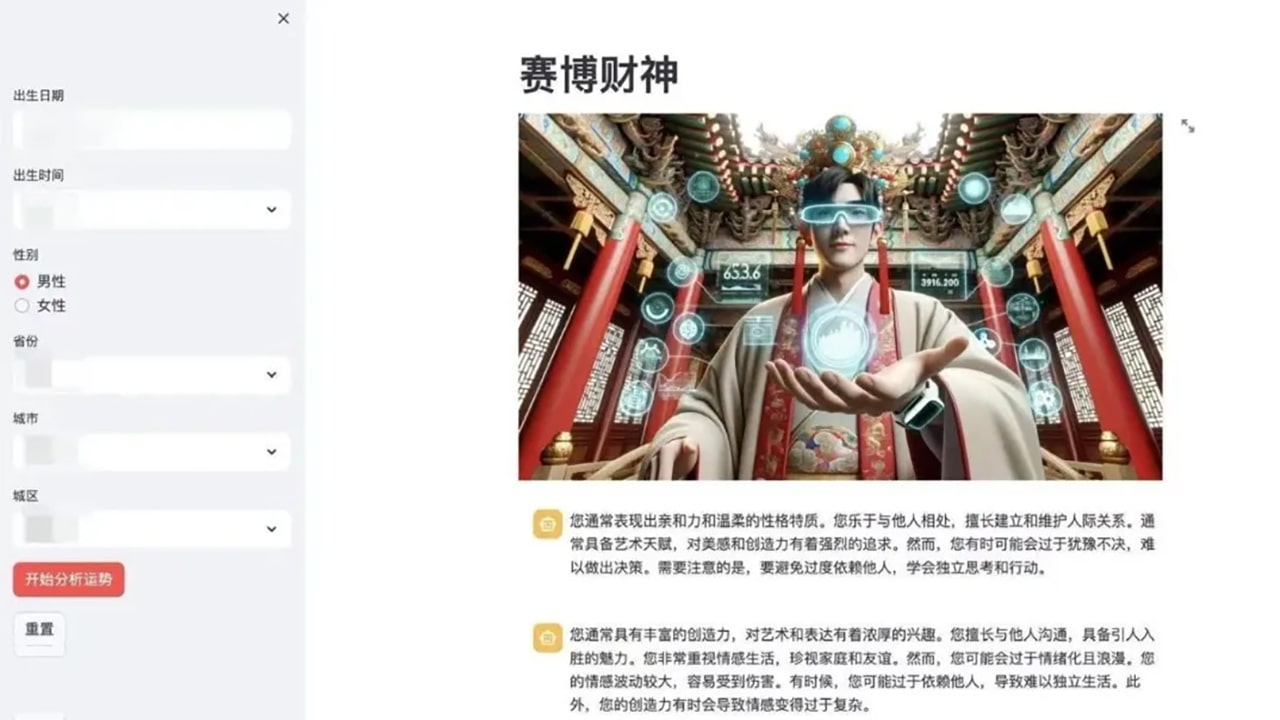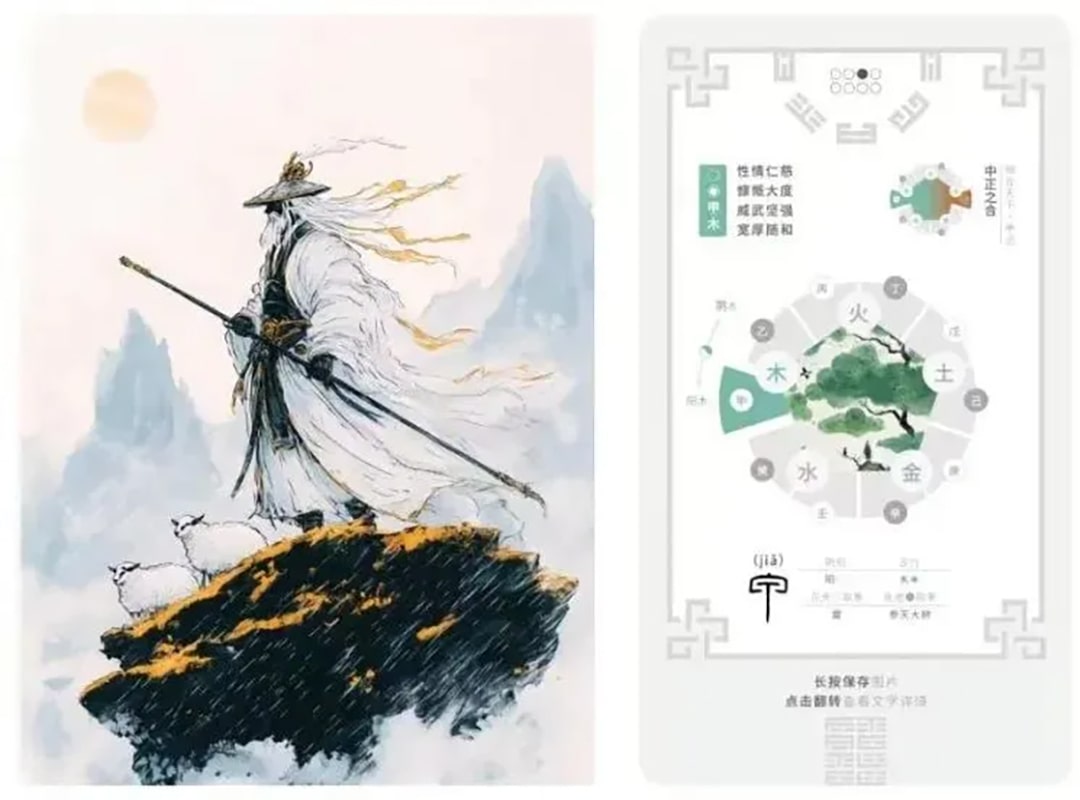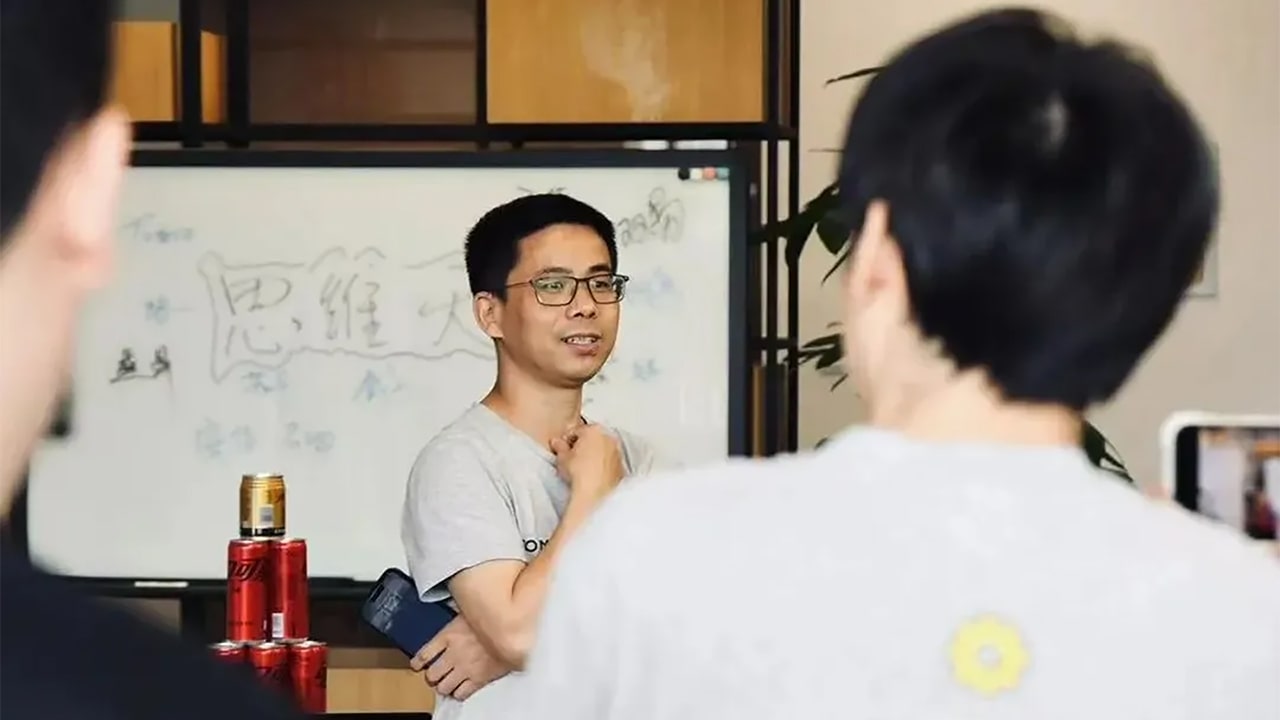Header image source: FateTell.
100 AI Creators is a weekly series featuring conversations with China’s leading minds in artificial intelligence. As technology evolves, their perspectives shed light on the ideas driving the AI era across borders.
Would you pay to have your fortune read by AI?
If life really is predestined, would you spend money to get a spoiler?
In an age of uncertainty, it seems more young people are turning to metaphysics to find clarity. Even though fate and fortune-telling are based on unverifiable, subjective interpretations, there remains a certain reverence for the idea of destiny—a desire, perhaps, to find some certainty in the chaos.
One product tapping into this desire is FateTell, an AI-powered Chinese fortune-telling platform. Launched nearly six months ago, the app is already nearing breakeven.
Long dismissed as superstition, fortune-telling has ostensibly become one of the few content verticals with a reliable monetization loop. Chinese astrology is among the most complex and systematized metaphysical traditions, and it’s gaining new life through the inferential powers of large language models (LLMs).
FateTell was founded by Levy Xi Yuan, a Hong Kong University of Science and Technology graduate who majored in English and statistics, with a strong background in natural language processing. Previously, he built software tools for patents and trademarks at a AI legal startup in Hong Kong, then explored commercial applications of AI at ByteDance’s Feishu (known internationally as Lark) and a Shanghai-based agent platform company.
In his spare time, Xi dives deep into the I Ching, Bagua, and the Huangdi Neijing. A former boss once took him on spiritual tours of temples across Hong Kong. At one Taoist temple, the abbot jokingly told him he had the makings of a master and should become a Taoist priest, just like a scene out of Stephen Chow’s Kung Fu Hustle.
By the end of 2023, as LLMs began showing notable inference abilities, Xi saw the potential in using them for fortune-telling. He quickly committed to building a startup at the intersection of AI and Chinese metaphysics, two fields that had never been meaningfully combined until now.

Why fate and fortune are an ideal use case for AI
For many, fortune-telling conjures up visions of mystics counting on their fingers or tossing coins to divine truths. These rituals can feel ancient, cryptic, and untethered from logic, but beneath lies a surprisingly structured system built on elements like the Bazi and Ziwei Doushu, two core branches of Chinese astrology that are ultimately symbolic systems of inference. They resemble mathematical graphs or probability models and are far more structured than they may seem.
For example, the Bazi system determines a person’s fate using birth date and time, mapping them into a matrix of “heavenly stems,” “earthly branches,” and five elements: metal, wood, water, fire, and earth. Ziwei Doushu uses the positions of stars and planets at a person’s time of birth to generate charts that offer readings similar in function to astrological birth charts commonly seen in the West.
A skilled fortune teller interprets these much like a neural network processes data. Their thinking can be modeled, measured, and in many cases, improved upon by machine inference.
Xi argues that AI’s modeling and inference capabilities make it especially well-suited for fortune-telling. As LLMs become more proficient in semantic modeling and logic generalization, Chinese metaphysics could become one of the easiest verticals for real-world application.
He points out that models like OpenAI’s o1-Pro perform noticeably better than their predecessors at fortune analysis. Still, current general-purpose LLMs are only at the level of a junior astrologer. That’s because they rely on noisy, inconsistent web data that tends to skew toward a handful of schools and lacks systemic rigor.
For AI-driven fortune-telling to improve, models require training on high-quality, structured, real-world cases, and such materials are usually locked away in personal notebooks, not published online. The ability to extract, organize and integrate this hidden knowledge is what Xi sees as his core mission and FateTell’s moat.
“AI-driven fortune-telling is no different from the AI legal solutions I worked on. Both involve highly structured data,” he said. “No one is more prepared to build this than I am.”
FateTell released its first product in December 2024..

Every fate is unique, even when it’s AI-generated
Enter your birth date and time, and within minutes, FateTell’s system renders a detailed analysis of your destiny.
But how does this differ from older fortune-telling apps which flourished in the internet era?
According to Xi, those tools typically rely on template stitching. They pull modular chunks of content from static databases based on a handful of variables provided, then reassemble those snippets to create reports. “Order ten reports and you’d see they mostly reuse the same text, with only minor changes to wording or section order,” Xi said.
In contrast, FateTell generates each reading using a user’s Bazi, or birth details, as its sole input. “Each report is internally consistent, context-aware, and fluidly written,” Xi said. “We’ve achieved true personalization at scale.”
The product has been paywalled from day one, offering two services. The first provides a life overview covering topics like marriage and wealth, while the second offers time-specific insights on a monthly, daily, and even hourly basis.
Users who wish to explore further can interact with a built-in AI agent. For example, if a reading recommends collaborative work, the user may ask what zodiac signs are best to partner with, and when will such people appear.
One power user reportedly completed over 600 rounds of back-and-forth with the agent—so many that it triggered a backend alert. Another user, based in North America, was torn between career offers from Google and Nvidia. Based on the user’s personal fortune data and live analysis of both companies, FateTell recommended one.
In a third case, a user asked whether to sell their property. The system advised proceeding in 2024, citing it as an auspicious year for transactions, otherwise recommending a wait until 2027 or 2028. When the user asked how to act quickly, the system predicted closing speeds across various real estate platforms. The property was ultimately sold on the final day of 2024.
“Real astrologers can charge anywhere from thousands to hundreds of thousands of RMB per session,” Xi said. “Our product costs a fraction of that and is available round-the-clock.” Users rarely question the cost, Xi added. “That’s because our offering combines decision-making support, emotional resonance, and reuse potential in a single experience.”
Compared to human advisors, the model brings broader and more up-to-date knowledge. “Even the most seasoned fortune tellers probably can’t tell you which real estate platform will close faster in 2024,” Xi said.
At the core of FateTell’s approach is a straightforward premise: fate is the emergent pattern of behavior, shaped by the ways individuals consistently interact with the world and make decisions over time. Different people display different behavioral tendencies, and those tendencies—repeated over years—can lead to different life outcomes.
Western systems like the zodiac or MBTI gained global popularity by classifying personality traits and behavioral patterns, offering users structured ways to understand themselves. Eastern metaphysics, Xi argues, provides even greater detail. A single birth chart can yield over a million distinct configurations, each influenced by time-sensitive variables like shifting fortune cycles.
That level of complexity, he believes, offers Eastern metaphysics not only higher resolution but also stronger potential for behavioral insight and, by extension, a larger market opportunity.
As FateTell nears profitability, AI Now! sat down with Xi to discuss how users are embracing AI-driven fortune-telling, the product’s ethical limits, and what’s next for the team.
The following transcript has been edited and consolidated for brevity and clarity.
“Ten times better than traditional fortune-telling”
AI Now! (AN): Many people use Doubao and DeepSeek to tell fortunes and find them quite accurate. What makes FateTell different?
Xi Yuan (XY): Fortune-telling actually involves three steps, and general-purpose models often miss the mark on all three.
Take charting, for example. Converting from the Gregorian to the lunar calendar and calculating luck cycles involves complex math. DeepSeek is a language model, so it struggles with these calculations and often builds charts incorrectly. Then comes interpretation. DeepSeek relies on public internet sources, which are noisy, biased toward a few schools of thought, and often low in quality. Finally, there’s an explanation. General models tend to pander. They’ll say whatever sounds good, rather than offering honest assessments.
At FateTell, we’ve refined each step. We built custom algorithms for accurate charting, used expert systems to reconcile multiple metaphysical traditions, and aligned the model’s tone with human fortune tellers to ensure value-driven interpretation.
AN: You work with real fortune tellers on training?
XY: Yes. Their main roles are in developing two core systems: our evaluation framework and our instructional corpus. These support the current product and, over time, will shape our proprietary model.
The evaluation framework is especially important. In vertical AI, domain-specific test sets are critical. Our fortune tellers directly assess model output and create test suites for Bazi-based reasoning. They work closely with product managers and machine learning engineers to refine the model based on those evaluations.
AN: Are they expensive?
XY: These are top-tier professionals, with market rates around RMB 30,000 (USD 4,200) per hour. We’re not paying that full rate, but even at a discount, the cost is significant.
AN: What base models does FateTell use?
XY: We use a mix: DeepSeek, Gemini, GPT, and Claude. But honestly, there’s still plenty of room for technical improvement. Our current pipeline is complex and computationally heavy, so generation speed is a bit slow.
There’s always a tradeoff between cost, speed, and accuracy. We’re prioritizing accuracy right now, because that’s what builds user trust, and trust is everything.
Fortunately, our users are willing to wait. In fact, a bit of friction in the experience might even enhance the perceived value.
AN: How do traditional fortune tellers feel about AI entering this space?
XY: Reactions are mixed. Some are skeptical, while others see where things are heading and choose to participate.
Our decision to work with them comes from my experience running an AI legal business in Hong Kong. In vertical AI, you need both product managers and domain experts. That combination is what makes anything meaningful happen.
AN: You’ve said FateTell will eventually include voice and video. Why not just stick to text since it already delivers the core value?
XY: I believe our product won’t truly be competitive unless it’s ten times better than traditional fortune-telling services. A single mode of interaction can’t achieve that. But a multimodal experience—one that engages sight, sound, and story—can reach that tenfold threshold, or even surpass it.
Take the term “jia mu,” for example. Most newcomers to Chinese astrology have no idea what it means. Ask a human expert and you might get a vague explanation. For users without background knowledge, the meaning still won’t land.
But we can deliver that same idea through AI-generated voice narration, dynamic imagery, and even short personalized videos. The first frame might show a towering tree, representing your symbolic identity as jia mu. Then the scene shifts to show the tree growing in a shaded canal, followed by a flowing body of water, each visual conveying constraints, emotional currents, and future opportunities.
Multimodal delivery gives users a deeply immersive, emotionally resonant experience. And in the end, great products compete on taste. Eastern metaphysics is rich with visual and symbolic beauty, and multimodal technology enables us to bring that beauty to life.
There’s also a litmus test for any AI-native product company: as the technology improves, do you feel limited, or excited? For me, every technical leap is additive. My job is to stockpile the breakthroughs in advance, and wait for the next “aha” moment.

98% of users care about wealth and career
AN: FateTell launched first in overseas markets. Where did your earliest users come from, and what were they like?
XY: Mostly from Xiaohongshu (known internationally as RedNote) and Jike. They’re typically 25–35 years old, well-educated, already comfortable paying for digital products, and have some baseline understanding of Chinese metaphysics. Overseas, most of our users are Chinese diaspora in North America and Australia.
Right now, our paid conversion rate is around 5%, which is higher than I expected. Repeat purchases are also strong. Many people use it for themselves and then buy reports for family or friends.
AN: Do you see FateTell as a decision-making tool or more of an emotional companion?
XY: I think the core of Chinese metaphysics is precision: its ability to guide decisions. That’s the “one” before an infinite string of emotional “zeroes.” Without that “one,” you’re just selling illusions. But if you lack the “zeroes,” the experience feels cold and transactional.
I’ve met some who are incredibly accurate but brutally blunt. Their readings can leave clients feeling scared or fatalistic, and that’s not what we’re aiming for.
We recently added an introductory coaching module based on psychological principles. If someone says, “I’ve been feeling really lost,” the agent doesn’t immediately launch into fortune-telling. It begins in coaching mode:
“I can sense the unrest in your heart, like a leaf caught in the autumn wind, circling without direction. This confusion is a quiet signal from within, asking you to pause and listen.”
“In the wisdom of divination, we say: one query, one reading. What is it you most need clarity on? A particular choice? The direction of a relationship? Or uncertainty in your career?”
We want users to start by recognizing their own inner state before turning to external answers.
AN: Some users say your financial predictions are spot-on, but relationship forecasts fall short.
XY: That tracks with our research. Among our first wave of seed users, 98% were focused on wealth and career. Only about 60% cared deeply about love and relationships. So with limited resources, we prioritized accuracy in professional domains.
We plan to build out compatibility and relationship modules. Those are in demand, but we haven’t gotten there yet.
One fun observation: most astrology products skew heavily female. But the gender ratio of our user base is mostly equal. I think that speaks to the more pragmatic tone of Chinese metaphysics, whereby it’s less about mysticism and more about utility.
Accuracy also depends on the type of prediction. We may not be able to say the exact year you’ll get married, but we can identify major turning points in your fortune or career with solid reliability.
That’s the strength of Bazi. It’s designed to reveal macro trends, not granular details.
AN: You’ve said that daily active users aren’t your main concern right now. Why?
XY: Because FateTell’s value doesn’t lie in frequency. It lies in longevity. If someone is constantly consulting us for every small decision, that’s not a healthy user relationship. That’s not what we want to encourage.
Mobile internet success is usually measured by high frequency, high urgency, high ticket size. But those front-facing use cases are already saturated. The long tail is where the real growth potential is.
Fortune-telling is a classic long-tail use case. It shows up in every facet of life. In fact, it’s one of the few truly lifelong services. And AI is uniquely well-suited to support that kind of role.
This lines up with a takeaway from HongShan’s recent closed-door AI summit: future products won’t just sell tools, they will sell outcomes.
AN: You’ve described FateTell as “Notion meets Lululemon.” What does that mean?
XY: It means we’re building both an efficiency tool and a lifestyle brand.
We compare ourselves to Notion because our product is, at its core, a personal planning tool. Notion democratized access to productivity systems. We’re doing something similar, because top-tier fortune tellers have always been expensive and exclusive, often only serving elites. We use AI to make that same level of expertise accessible to ordinary people.
And Lululemon? They turned yoga, a once-mystical Eastern ritual, into a global lifestyle brand. That’s fascinating to me.
I believe Chinese metaphysics can do the same.
Learn your fate, not change it
AN: If FateTell predicts someone is destined for poverty, do you ask them to accept it, or try to help them change it?
XY: I completely reject the so-called objectivity some traditional fortune tellers claim. Some will glance at a chart and dismiss it outright, saying it’s not worth analyzing.
That’s not what we do. FateTell will never tell a user what their “wealth ranking” is. If someone’s chart lacks financial fortune, we shift the perspective. We highlight other dimensions: academic potential, wisdom, family harmony. These are just as valid, just as meaningful.
And it’s not about putting a positive spin on things. It’s about reflecting reality. Wealth is just one dimension of a life.
AN: Would you call that an emotional value the product offers?
XY: It’s not about offering false comfort. The more charts I’ve read, the more convinced I am: yes, some people are born with immense wealth indicators in their charts, but everything comes at a price. Those charts almost always demand a tradeoff.
In a strict sense, there’s no such thing as a perfect fate.
I’ve been lucky. Back in school, I had the chance to meet quite a few people worth over RMB 1 billion (USD 140 million). You could see the wealth baked into their charts. But it had nothing to do with their education, personalities, ethics, or even intelligence.
Every one of them carried their own burdens. Health, childhood trauma, family issues, emotional isolation, strained relationships with siblings or children. The list goes on.
AN: Would you say that the idea there’s no such thing as a perfect fate is central to FateTell’s worldview?
XY: Let me share a story. After I started FateTell, I took part in a five-day I Ching course. The instructor walked us through over 100 cases: CEOs, women who’d divorced three times before turning 30, a man who lost his wife and daughter in a fire, and plenty of ordinary folks.
One day at lunch, I asked the teacher if he has ever seen anyone truly change their fate. He put down his chopsticks, looked at me, and said slowly: “To change your fate is to change your heart.”
In Chinese tradition, knowing your fate is considered a pivotal life milestone. But that one line—so simple, so hard—says everything.
AN: Some people believe in karma, past lives, or “residual energy” and turn to talismans or rituals to “fix” their fate. What’s your take?
XY: Chinese metaphysics generally falls into two schools: one that is numerical and logic-driven, and another that relies on symbolic tools and rituals. Concepts like karma or energetic debt belong to the latter.
That’s not our approach. From the beginning, I drew a clear line: FateTell would not use ritual to explain life. We believe in rational fortune-telling. We lean on statistics wherever possible and avoid ideas like karmic burden or “fate thinning” from overuse.
AN: If fate is largely fixed as suggested, isn’t that like how we look at the lives of ants? What, ultimately, is FateTell offering?
XY: In my mind, FateTell should go through three phases: presentation, curation, and activation.
We start by presenting your fate, which is what’s already written. Then we help you reflect and reframe. Finally, we support you in acting: shaping your own behavior to become the author of your life, the curator of your own unfolding story.
It’s a journey from knowing your fate, to accepting it, to transforming it.
Every person’s fate may be structured, but there’s a wide gap between the floor and the ceiling. What fills that space is human agency.
Two people may share the same fate pattern, but one can still live brilliantly by reaching the upper bounds of what’s possible. That’s what I want for every user: to live their best version of the life they were given.
Quick takes
AN: What has been the most surprising AI development for you since 2025 began?
XY: If I go back to 2024, Cursor really surprised me. So did Google’s NotebookLM. But in 2025, the biggest surprise has been DeepSeek, especially its handling of Chinese, even classical Chinese. It can match poetic rhyme schemes in song lyrics, which no overseas model I’ve seen can do.
AN: If you could shut down one AI product or trend you think is a false need or going in the wrong direction, what would it be?
XY: Early on, FateTell took the form of a chatbot modeled after Character.ai. Users could ask questions and get answers. But we quickly realized they didn’t know what to ask. Even with prompts, most users were still lost.
So we pivoted. Now we generate a 20,000-word report first, and users ask questions based on that. It created far more clarity and engagement.
AN: What do you think is overhyped—and most underrated—in today’s AI landscape?
XY: General-purpose agents are overhyped. There’s a narrative that once a supreme general agent emerges, the race is over. I disagree. Even the best general agent can’t solve everything. Each industry will still need its own vertical models.
What’s truly underrated is data quality. I always say: the amount of human effort determines the amount of intelligence. In vertical applications especially, quality matters more than quantity. Yet people remain captivated by buzzwords like workflows, prompts, architectures, and algorithms. But at the end of the day, model performance is just a reflection of the training data.
AN: What’s an opinion you hold that most people might disagree with?
XY: That pairing AI with metaphysics is a legitimate direction. A lot of people still dismiss it as superstition. That alone filters out many potential skeptics, and that’s fine by me.
AN: Lastly, recommend three books you love.
XY: First, “Ludwig Wittgenstein: The Duty of Genius.” That book helped me get through an existential crisis, and in some ways, probably saved me.
Second, “Deng Xiaoping and the Transformation of China” by Ezra Vogel. I think Deng was the greatest entrepreneur and CEO of modern history, bar none.
The third will probably be “Consciousness-Only: A New Science of Consciousness” by Yang Dingyi.
100 AI Creators is a collaborative project between AI Now! and KrASIA, highlighting trailblazers in AI. Know an AI talent we should feature? Reach out to us.

